 “My having glanced at the wives of others sleeping in their home will certainly do a great harm to my virtue.” (Hanuman, Valmiki Ramayana, Sundara Kand, 11.37)
“My having glanced at the wives of others sleeping in their home will certainly do a great harm to my virtue.” (Hanuman, Valmiki Ramayana, Sundara Kand, 11.37)
para dāra avarodhasya prasuptasya nirīkṣaṇam ||
idam khalu mama atyartham dharma lopam kariṣyati |
Celibacy and sobriety of thought, two vital components in making progress in life’s most important mission, are difficult to maintain in the face of visual distractions that come at every turn, wherever one looks, even if they don’t mean to be searching for unwanted sights. Nevertheless, in the Vedic tradition, the ancient system of spirituality instituted at the beginning of time by
Lord Krishna, the Supreme Personality of Godhead, there is heavy emphasis placed on the need to restrict both
illicit sex and
intoxication. Indeed, if we were to look around us and analyze major problems, we’d see that illicit sex is most commonly the root cause. The very existence of the phenomenal world, which guarantees heartache and separation pains with the arrival of each new temporary reward, continues on specifically because of the desire to enjoy sex life that bears no relation to spirituality. One who even looks at another woman that is not his wife does tremendous harm to his spiritual merits. One person in particular had no choice but to gaze upon others’ wives. Since he was engaged in the most sublime mission, he was able to maintain his clarity of thought, all the while becoming even more committed to pleasing the beloved lord of his life breath,
Lord Rama.
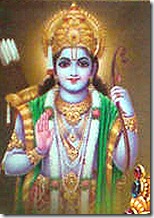
What does the Vedic restriction on sex life actually involve? And is it meant to just be a punishment for sinners? If that’s the case, aren’t many people today considered sinners? To understand the restriction, one must first juxtapose it with the aim of human life. The spirit soul is the identity within any life form, large or small, human or nonhuman. Different desires cause a variety in species, with some being intelligent and others being rather stupid. What we consider to be stupid is just an intelligence that has yet to fully develop, a consciousness driven solely by sense desires. The hog is considered an ignorant animal because it will eat its own stool and have sex with its own relatives without any qualms. An unintelligent person is likened to an ass, because the animal itself takes on loads of gear on its back simply for the paltry enjoyment of a few blades of grass. The grass is already available to the ass even if it shouldn’t listen to the commands of its master. A human being who operates without intelligence is likened to the ass that doesn’t know any better.
Real intelligence comes when the individual can ask the question, “Who am I?” When the guaranteed nature of birth, death, old age and disease are noted and analyzed, the human mind can reach the higher stages of thought. “Why do I have to take birth? Why must I die? Why do I even exist?” The Vedas provide many answers, both short and detailed, to satisfy the inquisitive mind. The short answer to the question of identity is that the spirit soul is a part and parcel of God, who, among many other things, is the ultimate reservoir of pleasure. As pleasure is the guiding force to activity, operating in God’s interests would then have to be the most worthwhile activity. The mature human being no longer engages in childish activities because they don’t provide any pleasure. Similarly, the most developed consciousness finds the ultimate reservoir of pleasure and remains attached to His interests through every thought, word and deed.
The influence of the senses can be very detrimental. The mature human being has advanced past the stage in life where everything is driven by sense desires. The mature adult knows how to limit food intake, regulate sleeping habits, and refrain from harmful behavior. Again, these regulations are accepted with a purpose, to actually increase enjoyment in the future. Similarly, the Vedic restrictions placed on sex life are there to provide a future benefit. The unintelligent act simply off of their sense demands, so conversely, the intelligent act only off of their soul’s demands. The soul and the material senses are strange bedfellows made to cohabitate due to the initial seed of desire for material enjoyment.
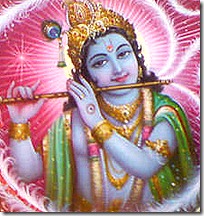
As long as sense demands man the helm and steer the ship, there is no chance of finding the reservoir of pleasure, whose form and beauty are so amazing that His most potent name is Krishna, which means all-attractive. As He is not lacking anything in the pleasure department, the same Krishna is also referred to as Rama, for He gives transcendental pleasure to whoever associates with Him. The urges for sex life and intoxication are driven by
maya, which lacks Krishna’s personal presence. Maya is illusion, something that promises one thing but delivers something completely different.
The Vedic regulation is that one only indulge in sex life to procreate. Any other type of sex is considered sinful. By sinful we mean an act that is guaranteed to provide a future detriment. In this case the primary negative consequence is the further thickening of the cloud of nescience enveloping the otherwise pure soul situated within the heart. To realize God’s blissful nature and the need for accepting His service, a clear head is required, one which isn’t a slave to impulses instigated by maya. When the individual is given to illicit sex life, to cavorting with people they are not married to, there is every chance of fall down.
If we look around us, the major scandals we see revolve around sex life. One congressman is texting pictures of his nether region to women not his wife; another man is engaging in illicit affairs with other men; a man is cheating on his wife; a female teacher is seducing her young male students; a priest is molesting young children, etc. When sex life is not controlled, the results can be disastrous, even to those who are not explicitly seeking spiritual merits.
For these reasons the Vedic regulations on sex life are very strict. During ancient times when adherence to Vedic principles was high, men and women were never allowed to freely intermingle, and every woman except the wife would be addressed as “mother” by a man. A wife would only decorate herself nicely for the pleasure of her husband; otherwise what need would there be to look exceptionally attractive? The strippers in the night clubs dress attractively to please other men, but the men aren’t allowed to do anything beyond seeing. Thus there is really no purpose to the attractive attire.
The restrictions on male-female relations may seem antiquated and outdated today, but what do people lacking God consciousness know anyway? The Vedic prescriptions have passed all quality control tests and they needn’t be apologized for. While the modern practices seem to be more evolved, all they do is create more trouble. The age old question of, “Can a guy and a girl just be friends?” is answered with an emphatic “No” by the
shastras. Sex life is the root cause for the material existence and the fueling of
reincarnation, so how on earth is it expected to be controlled when one is constantly in the company of members of the opposite sex? The sex drive is especially strong in men, as it is typically easier for an innocent woman to view other men in her life as being platonic friends.
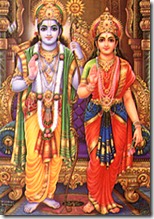
The Vedic regulations were weighing heavily on the mind of one of the most celebrated divine figures in history as he made his way through enemy territory. The same reservoir of pleasure meant to be the object of penance, sacrifice, charity and austerity descended to earth in a beautiful human form many years back. Known as Lord Rama, this prince of the Raghu dynasty was the same Supreme Personality of Godhead, but appearing in a spiritual form that allowed others to get a glimpse of what God looks like, what pleases Him, and what His nature is like. To provide real opportunities for service beyond simple adoration, Rama created situations where He could use some help. The most important of these situations related to the rescue of His wife,
Sita Devi, who had been taken to the island kingdom of Lanka.
For the initial reconnaissance mission, Shri
Hanuman, soon to be Rama’s most faithful servant, stepped up to the plate. Hanuman is an eternally liberated figure, forever devoted to God, but during Rama’s time on earth, he had not yet met the lord of his life. This fateful meeting would take place in Kishkindha, shortly after Sita had been taken away behind Rama’s back. Upon meeting Rama and His younger brother
Lakshmana, Hanuman knew that he had found the person he would dedicate the rest of his life to. Though all of the monkeys living under the rule of Sugriva in Kishkindha were tasked with finding Sita, only Hanuman was capable of making it to the enemy city of Lanka, which was situated far away from the mainland.
Just getting to Lanka was a struggle, but now the real difficulties were starting for Hanuman. He was all alone in enemy territory; no one around to help him or guide his activities. All he had was his fervent desire to please Rama and his extraordinary skills given to him by the higher authorities. He was not known for having exceptional scholarship, expertise in yoga, or material wealth. Nevertheless, he could make use of the highest intellect and every mystic perfection, or siddhi, when the situation called for it. Taking shelter of his tools, Hanuman scoured through the city of Lanka in a very tiny form. Several times he felt dejected over not having found Sita, whom he had never met. He knew that she would stand out, though, for Rama’s wife must be the most beautiful woman in the world who would be tremendously aggrieved upon separation from her Lord.
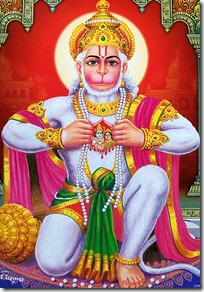
Hanuman finally made his way into the palace of the king of the Rakshasas, Ravana, who had taken Sita. Just as Hanuman is forever in the light of pure goodness, Ravana and the grossly sinful perpetually remain in darkness. What Hanuman saw in Ravana’s place was incomparable in beauty and also in dedication to the mode of ignorance, the lowest of the material modes of nature. The animal kingdom is considered to live in ignorance since it lacks the ability to think beyond the sense urges.
What Hanuman saw in this palace reserved for drinking was astounding. He saw beautiful woman after beautiful woman sprawled out in all sorts of positions. They had been drinking all night, and due to their inebriation they had passed out here and there. Some were too affected by drink to even make it into bed, so they fell asleep clutching various musical instruments. Some were so drunk that they didn’t even know who or what they were holding onto while sleeping. Every kind of animal flesh was laid out elegantly across the different rooms. Ravana, as a Rakshasa, had a voracious appetite for meat, as he even ate human flesh on a regular basis. The palace was not lacking anything in terms of meat. The various kinds of food were seasoned very nicely and just ready to be enjoyed. The increased appetites caused by the intoxicating beverages consumed made the meat eating even more enjoyable.
Seeing so many women asleep, with some even touching one another, Hanuman had to step back for a minute. He knew that he shouldn’t be gazing at them, for it is considered sinful to look at another man’s wife, especially while she is sleeping. These women weren’t wearing much either, and they were in vulnerable states. Any normal person would have become mentally agitated, thrown off of their righteous path, but not Hanuman. He is so kind, sweet, and pious that he even felt bad for having seen all of this.

And what could he do? Hanuman was not in Lanka of his own accord. He was looking for Sita, and even if he had to risk sin to find her, he would not stop. One can’t help but be inspired by Hanuman’s example. In the modern age especially the temptations of illicit sex are everywhere. It is practically impossible to avoid seeing beautiful women, some scantily clad and some not, unless one hides in a cave or gets locked up in a room. Despite the inauspicious conditions, if we can remain dedicated to the path of bhakti-yoga, or
devotional service, and chant, “
Hare Krishna Hare Krishna, Krishna Krishna, Hare Hare, Hare Rama Hare Rama, Rama Rama, Hare Hare”, there is every chance at success in spiritual pursuits.
Hanuman would forge ahead and continue his search for Rama’s wife. There exists no sin in Hanuman, as his mind can never deviate from the divine consciousness. He is always connected with Sita, Rama and Lakshmana in thought, word and deed. Therefore he was able to brush aside these unwanted visions and keep his eyes fixed on the prize. He would indeed find Sita, and eventually all would end well. The
deityform of the Lord, which resides in the temple or the home, can be gazed upon every single day, giving the eyes something pleasant to look at. And the mind can always remember Hanuman and his dedication to Rama. These two practices can keep us on the righteous path and help us to avoid the pitfalls of sinful life.
In Closing:
Urges for sex most difficult to control,
Of otherwise sane man do they grab hold.
In every which direction is one led astray,
Just like the boat by wind carried away.
Thus Vedas on sex do provide limits,
So that no cap will be on soul's happiness.
Call mother to all women except the wife,
In this way restricted will be sex life.
No worry about sin or future pain,
From penance for the Lord comes real gain.
Yet Hanuman in Lanka saw so much,
Women affected by liquor's touch.
They were married and seen while vulnerable,
Yet Hanuman still of sin not capable.
Felt bad rules of propriety transgressing,
Yet on the march for Sita he kept progressing.
Who is greater than Hanuman who takes all risk?
The chance to please Sita and Rama he'll never miss.
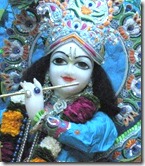 “I am the source of all spiritual and material worlds. Everything emanates from Me. The wise who know this perfectly engage in My devotional service and worship Me with all their hearts.” (Lord Krishna, Bhagavad-gita, 10.8)
“I am the source of all spiritual and material worlds. Everything emanates from Me. The wise who know this perfectly engage in My devotional service and worship Me with all their hearts.” (Lord Krishna, Bhagavad-gita, 10.8) So what can we do? How do we learn the right way to use the elements around us? The child eager for gifts is taught the value of money so that they eventually learn to curb their desires. Moreover, getting everything you want right away is not good for controlling the senses. For starters, getting what you want doesn’t actually equate to happiness. Our impulse may tell us to eat the entire pizza pie placed in front of us, but if we do so, pretty soon we’ll have a stomach ache. Despite the numerous studies conducted about how to prevent disease through avoiding and accepting certain foods, the key to healthy living is actually regulation. Just follow regular habits based on moderation, leave your body enough room to breathe without difficulty, and you will avoid so many ailments. Just think of how many problems are caused by straining the body, pushing it to the limits of action and thought. Too much stress at work results in painful conditions, as do excessive travel and exercise. Eat more than you need to and you will cause an imbalance in the body that will bring negative consequences.
So what can we do? How do we learn the right way to use the elements around us? The child eager for gifts is taught the value of money so that they eventually learn to curb their desires. Moreover, getting everything you want right away is not good for controlling the senses. For starters, getting what you want doesn’t actually equate to happiness. Our impulse may tell us to eat the entire pizza pie placed in front of us, but if we do so, pretty soon we’ll have a stomach ache. Despite the numerous studies conducted about how to prevent disease through avoiding and accepting certain foods, the key to healthy living is actually regulation. Just follow regular habits based on moderation, leave your body enough room to breathe without difficulty, and you will avoid so many ailments. Just think of how many problems are caused by straining the body, pushing it to the limits of action and thought. Too much stress at work results in painful conditions, as do excessive travel and exercise. Eat more than you need to and you will cause an imbalance in the body that will bring negative consequences. While steadfast devotion personally offered to the Lord has resulted in attainment of the supreme destination, which is akin to gaining
While steadfast devotion personally offered to the Lord has resulted in attainment of the supreme destination, which is akin to gaining 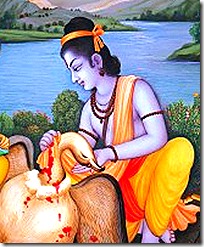 What is the difference between an adult materialist and an adult devotee? Don’t
What is the difference between an adult materialist and an adult devotee? Don’t 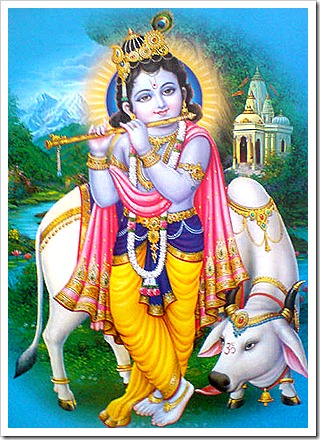 In Closing:
In Closing: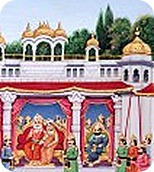 “That country is looking so beautiful, and the Vedas have described its purity. Known in the three worlds, Tirahut [Janakpur] is the tilaka of the earth.” (Janaki Mangala, Svayamvara Ki Taiyari, 4)
“That country is looking so beautiful, and the Vedas have described its purity. Known in the three worlds, Tirahut [Janakpur] is the tilaka of the earth.” (Janaki Mangala, Svayamvara Ki Taiyari, 4)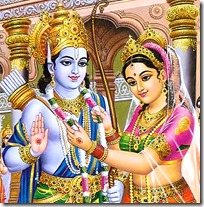 Why this land over others? Why not declare Ayodhya to be the tilaka, or even
Why this land over others? Why not declare Ayodhya to be the tilaka, or even 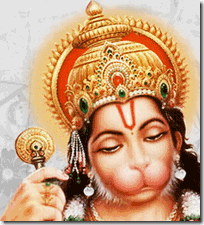 What is the significance in noting the tilaka? For the person immersed in Rama-lila, just hearing the word Tirahut or Janakpur immediately brings to mind the time Rama lifted up Lord Shiva’s bow and married Sita. What better image could there be for the mind to contemplate on? The sacred places on this earth are marked with the footprints of Vishnu during His several descents in avatara forms. The places of pilgrimage are those where noteworthy events relating to the Lord took place. Janakpur was certainly one of those places.
What is the significance in noting the tilaka? For the person immersed in Rama-lila, just hearing the word Tirahut or Janakpur immediately brings to mind the time Rama lifted up Lord Shiva’s bow and married Sita. What better image could there be for the mind to contemplate on? The sacred places on this earth are marked with the footprints of Vishnu during His several descents in avatara forms. The places of pilgrimage are those where noteworthy events relating to the Lord took place. Janakpur was certainly one of those places.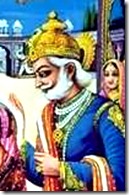 Take the example of getting to eat whatever you want and extend it out to every sensual pursuit, and you have what the average king’s lifestyle is like. Yet Janaka was so dedicated to piety, so knowledgeable of dharma and how to maintain one’s essential characteristic, that he was known as Videha, or bodiless. The senses had no influence on him. What’s more is that he even advanced past the stage of mystic yoga and became a full-fledged devotee, someone so devoted that he is today known as one of the twelve mahajanas, or authorities on
Take the example of getting to eat whatever you want and extend it out to every sensual pursuit, and you have what the average king’s lifestyle is like. Yet Janaka was so dedicated to piety, so knowledgeable of dharma and how to maintain one’s essential characteristic, that he was known as Videha, or bodiless. The senses had no influence on him. What’s more is that he even advanced past the stage of mystic yoga and became a full-fledged devotee, someone so devoted that he is today known as one of the twelve mahajanas, or authorities on 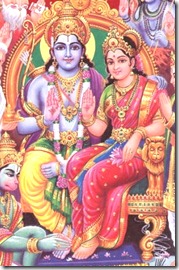 From the events described in the Janaki Mangala, we learn that Janaka would also get a tremendous thrill upon meeting Shri Rama and His younger brother
From the events described in the Janaki Mangala, we learn that Janaka would also get a tremendous thrill upon meeting Shri Rama and His younger brother 

















 “My having glanced at the wives of others sleeping in their home will certainly do a great harm to my virtue.” (Hanuman,
“My having glanced at the wives of others sleeping in their home will certainly do a great harm to my virtue.” (Hanuman,  What does the Vedic restriction on sex life actually involve? And is it meant to just be a punishment for sinners? If that’s the case, aren’t many people today considered sinners? To understand the restriction, one must first juxtapose it with the aim of human life. The spirit soul is the identity within any life form, large or small, human or nonhuman. Different desires cause a variety in species, with some being intelligent and others being rather stupid. What we consider to be stupid is just an intelligence that has yet to fully develop, a consciousness driven solely by sense desires. The hog is considered an ignorant animal because it will eat its own stool and have sex with its own relatives without any qualms. An unintelligent person is likened to an ass, because the animal itself takes on loads of gear on its back simply for the paltry enjoyment of a few blades of grass. The grass is already available to the ass even if it shouldn’t listen to the commands of its master. A human being who operates without intelligence is likened to the ass that doesn’t know any better.
What does the Vedic restriction on sex life actually involve? And is it meant to just be a punishment for sinners? If that’s the case, aren’t many people today considered sinners? To understand the restriction, one must first juxtapose it with the aim of human life. The spirit soul is the identity within any life form, large or small, human or nonhuman. Different desires cause a variety in species, with some being intelligent and others being rather stupid. What we consider to be stupid is just an intelligence that has yet to fully develop, a consciousness driven solely by sense desires. The hog is considered an ignorant animal because it will eat its own stool and have sex with its own relatives without any qualms. An unintelligent person is likened to an ass, because the animal itself takes on loads of gear on its back simply for the paltry enjoyment of a few blades of grass. The grass is already available to the ass even if it shouldn’t listen to the commands of its master. A human being who operates without intelligence is likened to the ass that doesn’t know any better. As long as sense demands man the helm and steer the ship, there is no chance of finding the reservoir of pleasure, whose form and beauty are so amazing that His most potent name is Krishna, which means all-attractive. As He is not lacking anything in the pleasure department, the same Krishna is also referred to as Rama, for He gives transcendental pleasure to whoever associates with Him. The urges for sex life and intoxication are driven by maya, which lacks Krishna’s personal presence. Maya is illusion, something that promises one thing but delivers something completely different.
As long as sense demands man the helm and steer the ship, there is no chance of finding the reservoir of pleasure, whose form and beauty are so amazing that His most potent name is Krishna, which means all-attractive. As He is not lacking anything in the pleasure department, the same Krishna is also referred to as Rama, for He gives transcendental pleasure to whoever associates with Him. The urges for sex life and intoxication are driven by maya, which lacks Krishna’s personal presence. Maya is illusion, something that promises one thing but delivers something completely different. The Vedic regulations were weighing heavily on the mind of one of the most celebrated divine figures in history as he made his way through enemy territory. The same reservoir of pleasure meant to be the object of penance, sacrifice, charity and austerity descended to earth in a beautiful human form many years back. Known as Lord Rama, this prince of the Raghu dynasty was the same Supreme Personality of Godhead, but appearing in a spiritual form that allowed others to get a glimpse of what God looks like, what pleases Him, and what His nature is like. To provide real opportunities for service beyond simple adoration, Rama created situations where He could use some help. The most important of these situations related to the rescue of His wife,
The Vedic regulations were weighing heavily on the mind of one of the most celebrated divine figures in history as he made his way through enemy territory. The same reservoir of pleasure meant to be the object of penance, sacrifice, charity and austerity descended to earth in a beautiful human form many years back. Known as Lord Rama, this prince of the Raghu dynasty was the same Supreme Personality of Godhead, but appearing in a spiritual form that allowed others to get a glimpse of what God looks like, what pleases Him, and what His nature is like. To provide real opportunities for service beyond simple adoration, Rama created situations where He could use some help. The most important of these situations related to the rescue of His wife,  Hanuman finally made his way into the palace of the king of the Rakshasas, Ravana, who had taken Sita. Just as Hanuman is forever in the light of pure goodness, Ravana and the grossly sinful perpetually remain in darkness. What Hanuman saw in Ravana’s place was incomparable in beauty and also in dedication to the mode of ignorance, the lowest of the material modes of nature. The animal kingdom is considered to live in ignorance since it lacks the ability to think beyond the sense urges.
Hanuman finally made his way into the palace of the king of the Rakshasas, Ravana, who had taken Sita. Just as Hanuman is forever in the light of pure goodness, Ravana and the grossly sinful perpetually remain in darkness. What Hanuman saw in Ravana’s place was incomparable in beauty and also in dedication to the mode of ignorance, the lowest of the material modes of nature. The animal kingdom is considered to live in ignorance since it lacks the ability to think beyond the sense urges. And what could he do? Hanuman was not in Lanka of his own accord. He was looking for Sita, and even if he had to risk sin to find her, he would not stop. One can’t help but be inspired by Hanuman’s example. In the modern age especially the temptations of illicit sex are everywhere. It is practically impossible to avoid seeing beautiful women, some scantily clad and some not, unless one hides in a cave or gets locked up in a room. Despite the inauspicious conditions, if we can remain dedicated to the path of bhakti-yoga, or
And what could he do? Hanuman was not in Lanka of his own accord. He was looking for Sita, and even if he had to risk sin to find her, he would not stop. One can’t help but be inspired by Hanuman’s example. In the modern age especially the temptations of illicit sex are everywhere. It is practically impossible to avoid seeing beautiful women, some scantily clad and some not, unless one hides in a cave or gets locked up in a room. Despite the inauspicious conditions, if we can remain dedicated to the path of bhakti-yoga, or